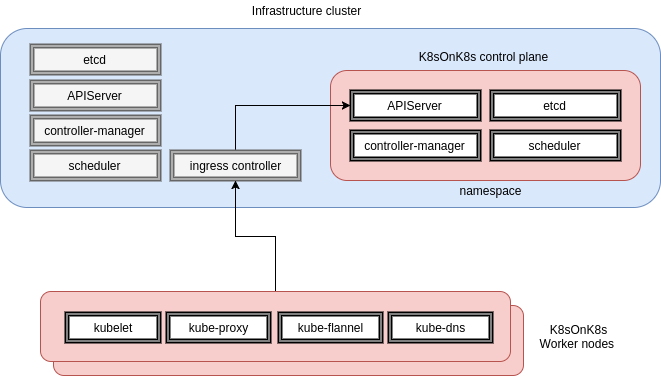This project aims to build k8s control planes on demand using an existing k8s cluster so you can easily test new versions, features or networking drivers without having to wait for an installer to support it.
It can also be used for teaching purposes giving every student a control plane using as little resources as what a few hyperkube and etcd PODs consume.
A master or infrastructure cluster provides control plane as a service to multiple delegated cluster administrators by granting each of them a writable namespace.
The Kubernetes hosted control plane is provisioned in that namespace just like any common containerized application using deployments, services and ingress native objects.
The cluster administrator can then connect his worker nodes to that control plane and create the necessary RBAC bindings for his consumers with no change to the infrastructure cluster.
A basic script creates the control plane for now but later a CRD will define the desired control plane and an operator will do the heavy lifting.
It's a WIP... a lot remains to be done. For now you get:
- A single etcd member with no persistence (until setup with operator)
- A k8s control plane with RBAC enabled (API server, controller-manager and scheduler)
- Kubeconfig files for the hosted cluster administrator and to connect kubelets
- Flannel and kube-proxy daemon-sets to be instantiated on workers
- Kube-dns on the first worker joining the cluster
Also note this 10.199.199.199 IP advertised in the API server manifest and setup locally on each worker's loopback interface as show below. This is a work around for in-cluster clients using the built-in kubernetes service to reach the API server (such as kube-flannel and kube-dns PODs) via a nodePort service.
TODO:
- Replace script by an operator and TPRs/CRDs
- Store TLS assets as encrypted secrets (requires 1.7 infra cluster)
- Use CoreOS etcd operator with persistent volumes
- Add mini ELK stack to visualize control plane logs
- Bridge authn/authz to external source
- Test with additional network drivers such as Cilium, Weave and Romana
- cfssl
- kubectl setup with the infrastructure cluster context
- Access to a writable namespace
- A functional ingress controller on the infra cluster
Specify the desired API URL hostname that must resolve and route to the infrastructure cluster's ingress controller. This could be as a CNAME to the ingress controller of the infrastructure cluster.
$ ./deploy.sh -h kubernetes.foo-bar.com -n namespaceX
CHECK: Access to cluster confirmed
CHECK: API server host kubernetes.foo-bar.com resolves
2017/07/25 08:31:46 [INFO] generating a new CA key and certificate from CSR
2017/07/25 08:31:46 [INFO] generate received request
2017/07/25 08:31:46 [INFO] received CSR
2017/07/25 08:31:46 [INFO] generating key: rsa-2048
2017/07/25 08:31:46 [INFO] encoded CSR
2017/07/25 08:31:46 [INFO] signed certificate with serial number 343368285204006686908415438394591991039302384146
2017/07/25 08:31:46 [INFO] generate received request
2017/07/25 08:31:46 [INFO] received CSR
2017/07/25 08:31:46 [INFO] generating key: rsa-2048
2017/07/25 08:31:47 [INFO] encoded CSR
2017/07/25 08:31:47 [INFO] signed certificate with serial number 634677056508179731833979679679719784750411028857
2017/07/25 08:31:47 [INFO] generate received request
2017/07/25 08:31:47 [INFO] received CSR
2017/07/25 08:31:47 [INFO] generating key: rsa-2048
2017/07/25 08:31:47 [INFO] encoded CSR
2017/07/25 08:31:47 [INFO] signed certificate with serial number 34772891780328732259434788313932796585661614421
...
secret "kube-apiserver" created
secret "admin-kubeconfig" created
secret "kube-controller-manager" created
secret "kube-scheduler" created
deployment "etcd" created
service "etcd0" created
deployment "kube-apiserver" created
ingress "k8s-on-k8s" created
service "apiserver" created
deployment "kube-controller-manager" created
deployment "kube-scheduler" created
Giving a few seconds for the API server to start...
Trying to connect to the hosted control plane...
......AVAILABLE !
Client Version: version.Info{Major:"1", Minor:"7", GitVersion:"v1.7.1", GitCommit:"1dc5c66f5dd61da08412a74221ecc79208c2165b", GitTreeState:"clean", BuildDate:"2017-07-14T02:00:46Z", GoVersion:"go1.8.3", Compiler:"gc", Platform:"linux/amd64"}
Server Version: version.Info{Major:"1", Minor:"7", GitVersion:"v1.7.2", GitCommit:"922a86cfcd65915a9b2f69f3f193b8907d741d9c", GitTreeState:"clean", BuildDate:"2017-07-21T08:08:00Z", GoVersion:"go1.8.3", Compiler:"gc", Platform:"linux/amd64"}
Deploying child cluster assets
secret "kubeconfig-proxy" created
daemonset "kube-proxy" created
clusterrole "flannel" created
clusterrolebinding "flannel" created
serviceaccount "flannel" created
configmap "kube-flannel-cfg" created
daemonset "kube-flannel-ds" created
configmap "kube-dns" created
deployment "kube-dns" created
serviceaccount "kube-dns" created
service "kube-dns" created
Tested on a CoreOS instance
Note: Update the k8s-socat.service unit to point to your API server nodePort
# mkdir /etc/kubernetes/tls -p
--> Upload kubeconfig-kubelets and ca.pem files under /etc/kubernetes/tls
MYIP=$(ip route list scope global | awk '{print $9}')
cat <<EOF>/etc/systemd/system/kubelet.service
[Unit]
Description=Kubernetes node agent
[Install]
WantedBy=multi-user.target
[Service]
Environment=KUBELET_IMAGE_TAG=v1.7.2_coreos.0
Environment="RKT_RUN_ARGS=--uuid-file-save=/var/run/kubelet-pod.uuid \
--volume etc-cni,kind=host,source=/etc/cni,readOnly=false \
--mount volume=etc-cni,target=/etc/cni \
--dns=host"
ExecStartPre=-/bin/mkdir -p /etc/cni/net.d
ExecStartPre=-/usr/bin/rkt rm --uuid-file=/var/run/kubelet-pod.uuid
ExecStart=/usr/lib/coreos/kubelet-wrapper \
--allow-privileged --require-kubeconfig \
--kubeconfig /etc/kubernetes/tls/kubeconfig-kubelets \
--cni-conf-dir=/etc/cni/net.d --network-plugin=cni \
--cluster-dns=10.3.0.10 --cluster_domain=cluster.local \
--hostname-override=${MYIP}
ExecStop=-/usr/bin/rkt stop --uuid-file=/var/run/kubelet-pod.uuid
EOF
cat <<EOF> /etc/systemd/system/k8s-socat.service
[Unit]
Description=Kubernetes API socat
[Install]
WantedBy=multi-user.target
[Service]
ExecStartPre=-/usr/bin/ip addr add 10.199.199.199/32 dev lo
ExecStart=/usr/bin/docker run --rm --net=host \
alpine/socat TCP-LISTEN:443,fork,reuseaddr,bind=10.199.199.199 TCP:testjfn.k8s.cloudsys.tmcs:30648
EOF
systemctl daemon-reload
systemctl enable kubelet k8s-socat
systemctl restart kubelet k8s-socat
A kubeconfig file with admin privileges was created under the tls directory.
Use it to perform administrator tasks and to create the additional RBAC bindings for the end user (if any but you !)
$ kubectl --kubeconfig=tls/kubeconfig get nodes
NAME STATUS AGE VERSION
192.168.1.124 Ready 13m v1.7.2+coreos.0
192.168.1.125 Ready 13m v1.7.2+coreos.0
$ kubectl --kubeconfig=tls/kubeconfig get pods -n kube-system -o wide
NAME READY STATUS RESTARTS AGE IP NODE
kube-dns-2177165803-19jgj 3/3 Running 0 3m 10.2.0.2 192.168.1.125
kube-flannel-ds-29nwm 2/2 Running 1 3m 192.168.1.124 192.168.1.124
kube-flannel-ds-btlg7 2/2 Running 1 3m 192.168.1.125 192.168.1.125
kube-proxy-fz6s5 1/1 Running 0 3m 192.168.1.125 192.168.1.125
kube-proxy-jtfk4 1/1 Running 0 3m 192.168.1.124 192.168.1.124
kubectl -n namespaceX delete deployment,svc,secrets,ingress --all
